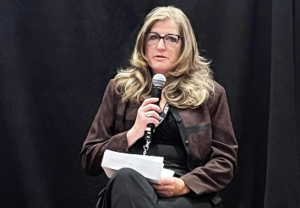Anishinabek member provides details on Indigenous procurement at Toronto conference

By Sam Laskaris
TORONTO – Progress is being made but so much more can still be done.
Those were among the messages that Angela Mark delivered at the Indigenomics Bay Street conference, which concluded on Oct. 18 in Toronto.
Mark, a member of Garden River First Nation, is the director of research for the Canadian Council for Indigenous Business (CCIB), and was a speaker on the Indigenous Procurement panel at the conference, which was held at the Sheraton Centre Toronto Hotel.
In 2019, the federal government had implemented a mandate that a minimum of five per cent of its procurement contracts must be awarded to Indigenous businesses.
“Our membership and our research have been studying federal, regional, and economic development corporations about procurement and our findings are that access to these contracts are one of the first and biggest obstacles or barriers that are faced,” Mark said.
Mark added it is imperative that those with Indigenous companies get face-to-face connections so that others can properly walk them through the procurement process.
Mark said the CCIB is doing its best to help. Earlier this month, the CCIB hosted an Edmonton event that attracted 330 attendees, and 170 of those were reps from certified Indigenous businesses.
“That was a fantastic first event to be able to provide opportunities for people to get together and make those connections and have those discussions,” she said.
Mark was asked for her thoughts on the current procurement process, since it is now five years old. A wish is that the minimum five per cent Indigenous procurement figure will be bumped up.
“We are hoping and expecting that that will be increased,” she said. “The corporations have been exceeding the five per cent, which has been fantastic and has created a lot of awareness that these things need to change and that we have those targets to work towards.”
Mark also offered up some advice during the panel.
For example, she said plenty of little things can be done to assist Indigenous businesses, even advocating for appropriation.
“If you see goods that are being appropriated, you can speak up to make sure that those goods are actually being procured through Indigenous businesses,” she said.
Mark also believes it is vital to help toot the horns of those who are making positive gains.
“When you do hear of Indigenous businesses that are enjoying some success, celebrate those that have gone through the process and have had success,” she said.
Mark also said it is important to research companies to ensure that if they are going to work with them that they are indeed authentic.
“The biggest message is ‘Buy Indigenous’,” she said.
Menelaos Argiropoulos and Alison Fernandes were the two other speakers on the Indigenous Procurement panel.
Argiropoulos is a regional manager for Public Services and Procurement Canada. Fernandes is a senior procurement specialist for Ontario Power Generation. The panel was moderated by Heather Berthelette, who is the CEO of the Tribal Councils Investment Group, which represents 52 First Nations in Manitoba.
The Toronto conference brought together Indigenous change-makers, innovators, and leaders from corporate Canada, the financial sector, governments, and Indigenous business. The aim was to display the strength of the Indigenous economy and to build bridges towards economic reconciliation.


